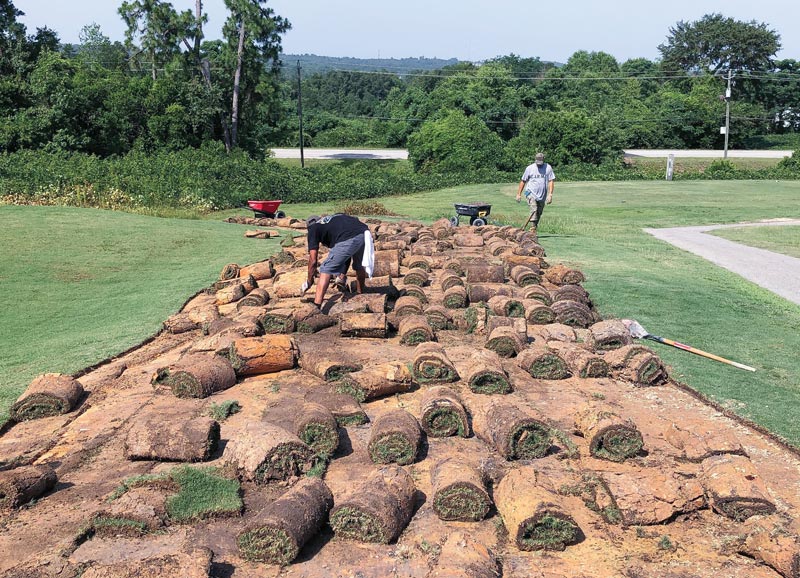
Labor force: Operation Double Eagle equips military veterans with sought-after skills, and engages this high-performing segment of the workforce to help meet the golf industry’s demand for quality employees. Photos courtesy of Operation Double Eagle
The more Scott Johnson did the math, the more convinced he became that he could make a serious dent in the most glaring concern of the constituents he serves and those who tend to the game he cherishes.
When Johnson — president and CEO of the Warrior Alliance, an Atlanta-based nonprofit that serves United States military veterans — thought about his “warriors,” he saw employment as among their most obvious need. When he thought about golf, he realized the corollary on the other side of the equation, labor, was the most prominent pain point.
“It was just a matter of putting two and two together,” Johnson says. “Veterans are continuously fighting unemployment or underemployment. Sixty-odd percent of veterans leave jobs within the first 90 days of employment due to a lack of training or lack of onboarding. After the experiences you go through in the military, sometimes you come out in the civilian world and get a handbook and attend a couple of meetings and you’re off and running.
“But there’s an opportunity to look at this particular skill set of veterans. They don’t necessarily want to work indoors. They don’t want to be on some corporate floor. This is a highly skilled source of labor that’s maybe not necessarily getting the education or the certification they need. And from being somewhat close to golf individually, as a player, I know just how that whole industry is dealing with major labor shortages. So on the one hand, there’s a tremendous demand, and on the other, there’s this tremendous supply.”
Wouldn’t it be something, then, if somebody could find a way to bring the two together?
Simply put, Johnson has: Operation Double Eagle.
Started in 2020 but put on temporary hiatus because of the pandemic, Operation Double Eagle is a Warrior Alliance workforce-development program that provides golf course-centric classroom and hands-on education and job-placement assistance for veterans in the Augusta, Ga., area. Though there are countless veteran-support organizations, none is as focused on golf course management as ODE.
“It’s just the healing aspect of being outdoors and working in teams,” Johnson says of why he thought to channel veterans into this course. “It’s the environment of working at the golf course. And look at all the different skills you can learn: turf, irrigation, maintenance, operations, landscaping. This gives them all a number of different career paths. Maybe you want to be an irrigation tech, or maybe you’re into horticulture, or turf, or maybe landscaping. There are a lot of career options. And the golf course industry in general is being outside. You’re not around all the noise and pressure, with people in their face constantly. We hear time and again, ‘This is the first time I’ve stopped just to hear myself think.’ There’s a healing aspect for them.”
A classroom at Augusta Municipal Golf Course
Operation Double Eagle is a nine-week certification course in golf course management through Augusta Technical College. Every nine weeks, up to 15 selected veterans through ODE receive free education and a monthly stipend. Importantly, they’re not required to use their GI Bill benefits, and upon completion of the program, the graduates receive Augusta Tech’s golf turf and landscape specialist certificate.
Crucially, the education isn’t just book learning. Every morning, participants gather in the classroom to study horticulture science, turf management, irrigation, pesticides and golf course maintenance. Every afternoon, they reconvene at the Double Eagle Performance Center, a dedicated — and non-playable — par-3 hole tucked behind the driving range at Augusta Municipal Golf Course, which locals call “The Patch,” to put their morning studies into practice. Golf Digest coined the Patch lab the “most inspiring par 3 in all of Augusta.”
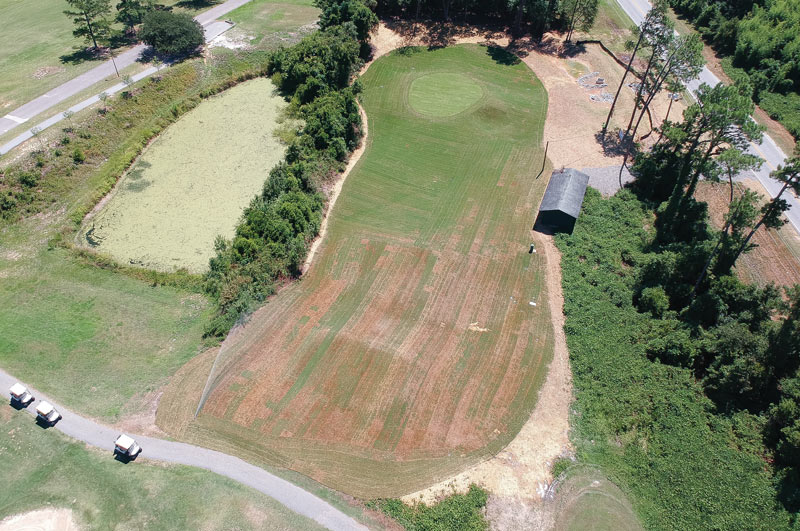
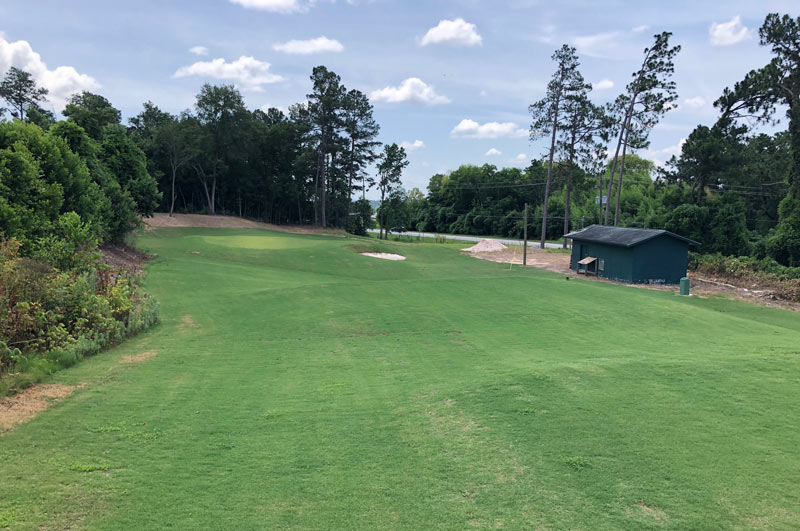
Views of the Double Eagle Performance Center, where veterans in the Operation Double Eagle program hone their skills. The hands-on learning lab is located at Augusta (Ga.) Municipal Golf Course.
Participants also take field trips. The summer cohort visited East Lake Golf Club in Atlanta and witnessed prep work for the PGA Tour Championship.
“It’s a great component,” Jermaine Whirl, Ph.D., president of Augusta Tech, says of the outside-the-classroom learning. “One thing we’re trying to focus on, we want individuals working in the field. What better way to do that than by having them out working on a public golf course and to see it from start to finish, then to move on to a professional role?”
It’s not purely theoretical. Operation Double Eagle began in February 2020 with 11 veterans but was interrupted by the pandemic. Since reopening in late 2020, 28 veterans have graduated from ODE. Among those grads, 80% are employed in related professions, including four at four golf courses. Another 10% enrolled in further technical college courses.
Editor’s note: In a tricky labor market, some superintendents have found a staffing solution in retired workers ready for their second act. Learn more in Retirees fill gaps in golf course maintenance crews.
Johnson makes it clear Operation Double Eagle is more than just a piece of paper. He doesn’t want hundreds of ODE grads to have certificates hanging on walls. He wants 100% of ODE grads to have, at least, jobs. At most, he wants them to have purpose.
“I have this phrase: ‘Rediscover your warrior,’” Johnson says. “Maybe you’ve lost your ‘warrior’ since you left the military. Maybe you’ve fallen prey to things in your life. Discover that person, that inner warrior, first, and get passionate about something. There are 10 topics in this program. Get passionate about one of them. Maybe you want to go on and get a four-year degree. Maybe you love learning about weeds. Maybe it’s landscaping. There’s so much here, and that’s why it’s such a win.”
Operation Double Eagle success stories
Shannon Bowling might be one of ODE’s biggest winners.
Bowling, who turned 49 in December, graduated from Operation Double Eagle’s second class, in December 2020. A retired Army sergeant first class, Bowling spent nearly two decades in the service — four years in the Marines, then another 16 in the Army. He deployed three times, to Djibouti once and twice to Iraq.
Once he retired, he returned immediately to school and earned two associate degrees — one in golf course management (at Augusta Tech, that program does include turf and horticulture instruction, but skews toward pro shop or front-office preparation) and one in cybersecurity. He thought his second career would involve cybersecurity, but then an instructor told him about the fledgling Operation Double Eagle program, and Bowling — an avid golfer — was intrigued.
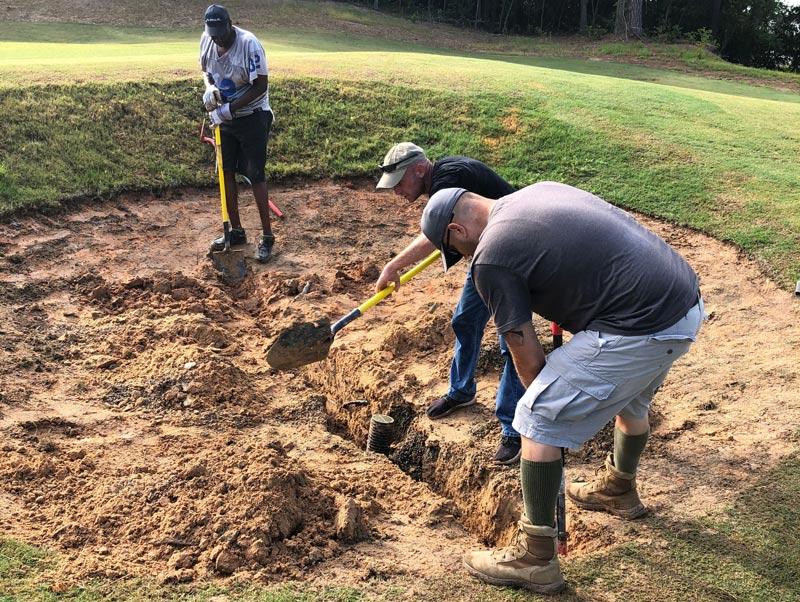
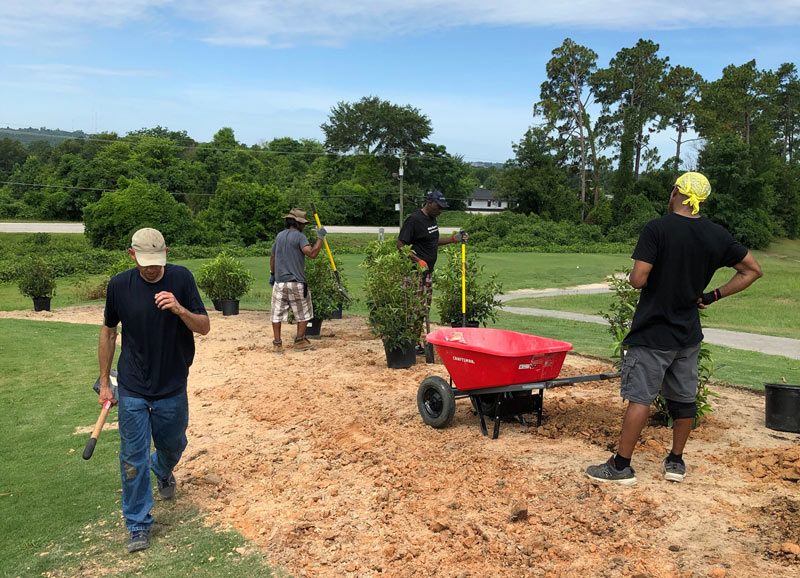
Operation Double Eagle’s nine-week certification course provides training in golf course management and related professions, such as landscaping. Since late 2020, 28 veterans have graduated from ODE, and four are currently employed at golf facilities.
“With me being a golfer, I figured I might like this job better than dealing with the military after dealing with the military for 20 years,” Bowling says. “I like working outside, being outside, and using equipment. But mainly, it’s just being outside. Being a golfer, you want to see a good course, but I never really knew what went into it, what goes on behind the scenes. Now, when you have members coming up to you and telling you you’re doing a good job, it’s satisfying to think, ‘Hey, I helped make this what it is.’”
He’s not just whistling “Dixie.” About a month after his ODE graduation, Bowling was hired on at the Creek Course at Reynolds Lake Oconee, a resort about halfway between Atlanta and Augusta. This month will mark his one-year anniversary there, and his boss, Hoyt Ellspermann, has just one complaint: “I just wish we could get more like Shannon,” Ellspermann, a GCSAA Class A superintendent and 20-year association member, says. “I’d like to hire five or six more guys like Shannon. He’s done a fabulous job and is a hard worker. He’s done a tremendous job — everything we’ve asked him to do and then some. He’s super helpful, and he gets along well with the staff and the crew. I couldn’t ask for a better guy.”
Some of that, no doubt, is intrinsic. But neither man questions whether the ODE training helped Bowling hit the ground running at Reynolds Lake Oconee.
“I think it prepared me really well,” Bowling says. “When they put me on equipment, I knew what I was doing. Part of that was the hands-on work, going to the performance center, where we’d learn the practical application of what we learned in the morning. If we talked about mowers in the morning, we were working with mowers in the afternoon.”
CBS Evening News profiled Operation Double Eagle in November 2021, highlighting how the program helps veterans transition to civilian life:
Nobody would confuse a nine-week certification education with, say, a four-year turfgrass degree, but Ellspermann noticed from the start that Bowling had a much better grasp on what the job entailed than any off-the-street applicant.
“I think that program is a great concept,” Ellspermann says. “Anytime you can get employees that already have some turf experience is great. He seems pretty content doing what he’s doing for us, but he could go on to be an assistant superintendent if that’s something he’s interested in pursuing. He was in charge of a lot of guys when he was in the service.”
Editor’s note: A partnership with a women’s prison has solved a South Dakota superintendent’s labor struggles and helped inmates’ lives change course. Read more in Unlocked potential: Inmates in golf course maintenance.
Not all Operation Double Eagle participants are necessarily looking for a new career.
Take David Bluthardt, for example, who was part of the ODE class that graduated in September 2021. A retired master chief, Bluthardt spent 26½ years in the Navy as an explosive ordnance disposal technician. He deployed to Afghanistan, Iraq, Kosovo — “Pretty much anywhere there were conflicts,” he says. He then spent almost 10 years working for the Department of Homeland Security.
“I already retired from two other careers,” Bluthardt says. “Now I’m looking for something that’s just really going to bring me joy. I love golf. I’m not a great golfer, but I love golf, and I really enjoy being on a golf course, so this really seemed to be kind of a fit. But I didn’t want to walk into a golf course and say, ‘Hey, are you hiring?’ I wanted to have some knowledge and skill set in regards to what position they might have open. I’d just like to be on a grounds crew somewhere, maybe permanent part time, working with equipment, helping to make sure the golf course is as nice as it can be.”
‘I want to nationalize this’
While it might make a nice story that Operation Double Eagle is cranking out a handful of graduates and sending them out into the workforce in a tiny little corner of the country, Johnson says there’s more to it. Though ODE deliberately started in Augusta — given its name recognition within the golf world and its proximity to a huge base of veterans — the program can scale, Johnson insists.
“Every organization has a headquarters, and this is ours,” he says. “We’re in the mecca of golf, with one of the best technical colleges, a huge military population and history. It’s the perfect time and place to have all of these resources to put this project together. But I want to nationalize this. I want to take this to Texas and New York, different locations. We already have some venues where we could set the program up. That’s the two-year plan, but we need to do what we need to do now, get the headquarters up and running and then start strategic planning. It serves no purpose if you can only do it in one location.”
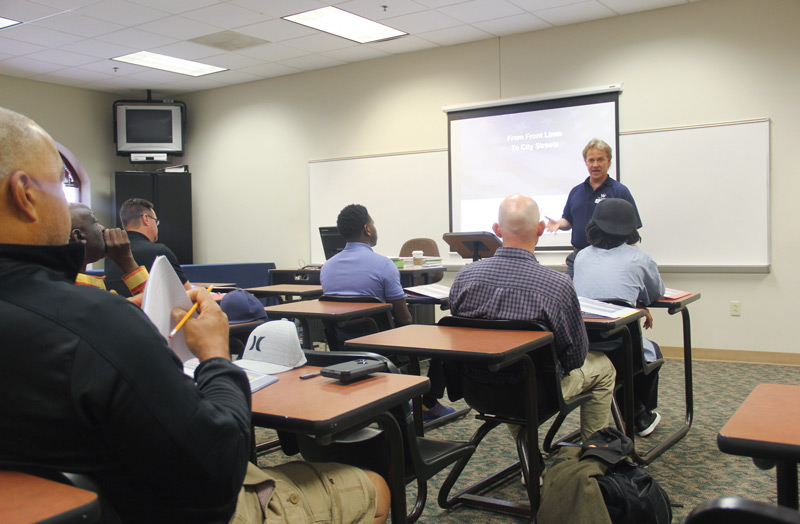
The Operation Double Eagle workforce-development program consists of classroom instruction — that’s founder Scott Johnson at right in the photo — in the mornings and on-course application of the curriculum in the afternoons.
Whirl, the Augusta Tech president, concurs.
“Augusta is a great headquarters for it, but our vision is to be nationally recognized,” he says. “What we’re trying to do is create the model that other colleges around the country can emulate. Our next goal is, how can we spread this and share this with other colleges around the country, and how do we get major corporations on board to create a brand? I think we’re on the cusp of making those major headways sooner rather than later.”
With nearly 19 million veterans in the United States and the critical labor shortage in golf course maintenance showing no signs of abating anytime soon, there’s no question there’s plenty of supply and demand.
“We really haven’t even turned on the faucet yet,” Johnson says. “The sky’s the limit.”
Andrew Hartsock is GCM’s managing editor.